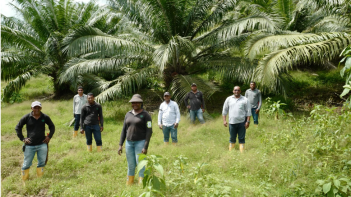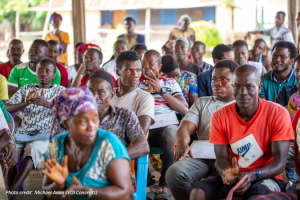
Sierra Leonean smallholders of the Ngoyaï Gbaayegie Group, the first in Africa to receive RSPO Certification. Photo credit: Michael Anao (VOI Concepts)
A dusty red road diverges from Sierra Leone´s main highway. Hours of driving across rural landscapes has revealed the country´s wild beauty – a spell of white sand coastlines, verdant forests, and distant mountain peaks covered in fog – leading to the small town of Damabu in Sierra Leone´s Eastern Province. Just behind the village, you can glimpse the healthy fronds of the towering trees of banga – oil palm – the community´s main source of livelihood. Damabu is one of several communities of oil palm smallholders who have collectively achieved a big milestone.
In 2021, the Ngoyaï Gbaayegie Group became the first independent smallholder group in Sierra Leone, and the first in Africa, to receive RSPO Certification. Within the production zone of Goldtree Sierra Leone Ltd, they obtained certification for their group of 4,983 independent smallholders, covering a total land area of 8,667 hectares. To date, they have the distinction of being the single largest certified independent smallholders group across all regions in terms of number of smallholders.
This triumph for the African region was made possible through the RSPO Smallholder Support Fund (RSSF), with technical support from the RSPO Secretariat and implementation on the ground carried out by Goldtree Sierra Leone, playing the role of Group Manager.
Better yield, better lives
Expressing themselves in their native Mende and Krio languages, some smallholders of Ngoyaï Gbaayegie shared how the training they had received significantly improved their yields – some seeing as much as a fivefold increase in their fresh fruit bunches.
Alpha Lahai, who has been cultivating oil palm for fifteen years, said, “The most important lesson I learned was on BMP (Best Management Practices). We learned how to maintain our farms, pruning, circle weeding and packing palm fronds. Now, my farms are always clean and pruned, and the trees are producing more than ever.”
A healthy harvest was naturally followed by increased profit. “My life has improved with better income. I can now pay my children’s school fees and feed my family. I can pay medical bills when a family member is sick. I bought zinc rooftops for the new home I am building,” he shared.
Smallholder Alusine Tejan echoed his sentiments. Since becoming a member of Ngoyaï Gbaayegie, he has likewise seen many changes in his farm. “During our training, we learned not to use fire in our plantation for land preparation. My farm has been producing more since applying the lessons learned during training. I am happy with the way my farm is producing, I can sell my palm fruits and get enough money to take care of my family and pay my children’s school fees.”
“Beaucoup beaucoup money”
In the nearby Talia community, smallholder Semgbe Fatorma is considered a role model for his orderly plots and neatly pruned palm trees.
“After the training, I started implementing circle weeding and effective pruning in my farm. This helped me gather more loose fruits than before. My trees used to give me two to three bunches, but with the BMP training, the palms have started giving me ten to twelve bunches!” he said.
“Since we received the RSPO certificate, the Talia community has improved greatly because we sell more banga to earn more cash. Before, we used to sell our bunches at a low price. Now we get beaucoup, beaucoup (much, much) money with this certificate.”
Economic Opportunities for Women, post Civil War
It has been two decades since Sierra Leone ended its eleven-year civil war. As the West African nation continues to recover and rebuild, palm oil has been identified as one of the three agricultural sub sectors that can effectively stimulate socioeconomic growth, alleviate poverty, and create job opportunities for women. In Sierra Leone, women play an important role in the sector, undertaking 60% of the job on traditional palm oil production and processing activities.
Rebecca Yatta Samar is an elderly Sierra Leonean lady who worked as a teacher for 42 years before returning to her village after the civil war. She shares that because of her previous work as a school teacher, she was granted a few hectares of land by their chiefdom and has since been engaged in oil palm farming for the past twenty years.
“It was difficult at first because it was right after the war when I came home,” she said. “There was no money, but we managed. I bought the seedlings, and hired people to work on the land. The most important lessons I learned was first, how to maintain our farms. And no child labour is allowed here. I taught those who were working on my farm what I learned from the training. Eventually, the palms were getting more light, and with more light, there was more yield.”
“Farming has taught us to be self reliant. It’s out of this banga farm that we were able to start building a house. The children are always well fed and they are going to school.”
Rebecca added that joining the farmers group has given her fond memories, as she met old friends and made new ones.
“In Africa, people say that women are just for the kitchen. Women were not sent to school. So when people come and visit my farm, especially the women, they always say ‘oh! Madame Rebecca has done much! Let me try it for myself.’”
Future Hopes
As the Ngoyaï Gbaayegie group approaches their RSPO Certification renewal in May 2023, the smallholders are optimistic about their future.
“I have seen the farmers in my community coming together and working collectively on each other’s farms,” said Alpha. “This RSPO Certification means a lot to me. I am happy and I want more farmers to be part of this group.”
“We should encourage more farmers to join so they will see the benefit of this training we do,” said Rebecca. “We learn from one another. The facilitators are not the only ones giving us knowledge, we also pour in our own,” said Rebecca. “My hope for the future is that I want more people to be self-reliant, especially women, because many women’s husbands have died for some years, but if you have a farm like this, you´ll be able to support yourself and your children.”
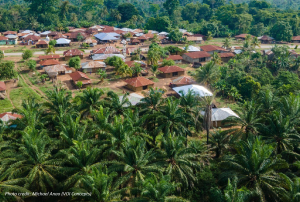
Rural community in Eastern Sierra Leone nestled within `banga´ (oil palm) farms. Photo credit: Michael Anao (VOI Concepts)
Keep reading

Access into prisma
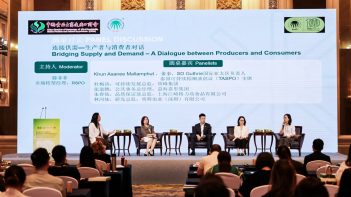
10 Years of RSPO in China: Driving Palm Oil Transformation Towards Sustainability
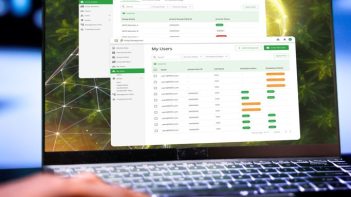
Updated Trace Function in prisma

Call for Expression of Interest: Independent Investigation of a Complaint

Latin American Smallholders, Key Global Brands Gather in Peruvian Amazon to Advance Sustainable Palm Oil

RSPO Forum for Members and Certification Bodies 2025: Strengthening Capacities and Building Bridges with RSPO Members

From Violence to Prosperity: Cultivating Sustainable Palm Oil in San Pablo, Colombia
